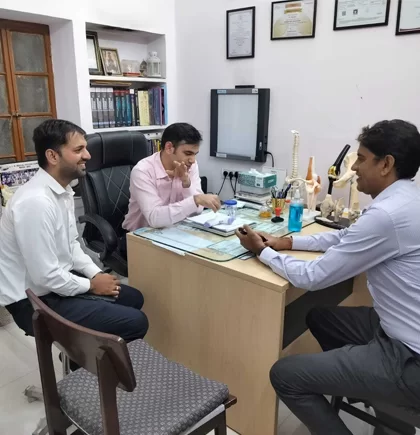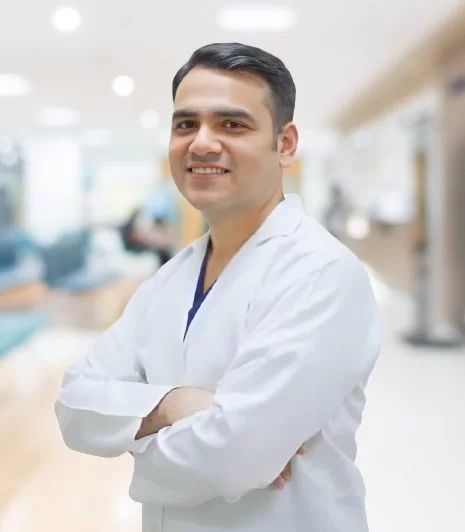
Jeevan Lok Hospital...
M-34 Sector 12, DAV School Chaur...

Dr Rohan Jain - Orthopedic Doctor in Jaipur
Dr. Rohan Jain is a renowned joint replacement surgeon in Jaipur, recognized for their expertise in restoring mobility and function to individuals with joint-related issues. With extensive experience in performing hip, knee, and shoulder replacement surgeries, Dr. Rohan Jain utilizes cutting-edge techniques and advanced technologies to ensure optimal outcomes for patients. Their commitment to precision, compassionate care, and personalized treatment plans has earned them a reputation for excellence in the field of joint replacement surgery in Jaipur
Welcome to Dr. Jain’s Bone & Joints Clinic, the leading orthopedic clinic in Jaipur, Dr Rohan Jain – Orthopedic Doctor in Jaipur specializing in the treatment of various orthopedic issues like knee pain, hip pain, joint pain, or complex fractures, our clinic is dedicated to providing top-notch medical care and advanced treatment options to help you get back to a pain-free and active life. The clinic is expertly run by Dr. Rohan Jain, a highly experienced joint replacement surgeon in Jaipur.
If you are seeking the best orthopedic care in Jaipur, look no further than Dr. Jain’s Bone & Joints Clinic.
The clinic is highly reliable and 100% safe and trusted.
Dr. Jain’s Bone & Joints Clinic offers top-notch medical services for bone and joint conditions.
Dr. Rohan Jain,at Dr Rohan Jain – Orthopedic Doctor in Jaipur is a experienced surgeon who has done MBBS, MS (Ortho), DNB ( Ortho), FJRS, and FIMS.
The clinic has an online appointment facility available so patients can easily book an appointment at Dr Rohan Jain – Orthopedic Doctor in Jaipur.
We provide various orthopedic condition treatments at Dr. Jain’s Bone & Joint Clinic, Jaipur.
Knee replacement surgery, also known as knee arthroplasty, involves the replacement of all or a portion of your knee joints. During the procedure, your surgeon will replace damaged cartilage and bone with an artificial joint, typically made of metal. The recovery process can take up to a year for complete rehabilitation, but you can gradually resume some of your regular activities as you heal. This surgery is a form of arthroplasty, where damaged components of your natural knee joint are replaced with a prosthetic joint for improved functionality and reduced pain.
Conditions are treated with a knee replacement:

Dr. Rohan Jain MBBS, MS (Ortho), DNB ( Ortho), FJRS, FIMS
Experience effective shoulder replacement surgery at Dr. Jain’s Bone & Joint Clinic in Jaipur. Meet Dr. Rohan Jain,at Dr Rohan Jain – Orthopedic Doctor in Jaipur an accomplished orthopedic specialist (MBBS, MS, DNB, FJRS, FIMS), providing expert care for your shoulder ailments. Regain mobility and comfort with our trusted surgical solutions.

Dr. Rohan Jain at Dr Rohan Jain – Orthopedic Doctor in Jaipur is a highly experienced joint replacement surgeon in Jaipur. With over 11 years of practice, he is an unparalleled expert in performing successful joint and knee replacement surgeries, boasting a remarkable 100% success rate. Dr. Rohan Jain did thousands of treatments and procedures, specializing in Arthroplasty (joint replacement surgery) for the knee, hip, shoulder, elbow, and small joints, as well as Trauma and Arthroscopy for the knee, shoulder, and hip. Currently, He is working at Eternal Hospital, Jaipur as a Consultant in Orthopaedics and joint Replacement.
He has extensive experience in addressing various issues, ranging from fractures, arthritis, and rheumatoid arthritis to sciatica, back pain, hip pain, joint pain, knee pain, ligament tears, neck pain, and sports injuries, among others.
Shoulder replacement surgery is typically considered when conservative treatments, such as medication, physical therapy, and lifestyle modifications, no longer provide sufficient relief from pain and impaired mobility caused by shoulder joint damage or conditions. Some common reasons when shoulder replacement might be needed include:
Osteoarthritis: This is the most common reason for shoulder replacement. Osteoarthritis occurs when the cartilage that cushions the joint wears away, leading to bone-on-bone contact and resulting in pain, stiffness, and decreased range of motion.
Rheumatoid Arthritis: Inflammatory arthritis like rheumatoid arthritis can cause damage to the shoulder joint, leading to pain and reduced function.
Post-Traumatic Arthritis: If the shoulder joint has been injured due to a fracture or severe trauma, it may lead to the development of arthritis over time, necessitating replacement.
Avascular Necrosis: In cases where the blood supply to the humeral head (the ball of the shoulder joint) is compromised, the bone may deteriorate, leading to the need for replacement.
Rotator Cuff Tear Arthropathy: A severe, irreparable rotator cuff tear can cause changes in the shoulder joint that can result in arthritis and require replacement.
Failed Previous Shoulder Surgery: If previous surgical interventions have not provided relief or have led to complications, shoulder replacement might be considered a last resort.
Severe Fractures: In cases of severe fractures involving the shoulder joint, replacement may be necessary to restore function and relieve pain.
Glenohumeral Joint Instability: When the shoulder joint becomes unstable due to various reasons, it can lead to pain and difficulty in daily activities, potentially requiring replacement.
There are several types of shoulder replacement surgeries, each designed to address different conditions and degrees of shoulder joint damage. Here are the main types:
Total Shoulder Replacement (Total Shoulder Arthroplasty): This involves replacing both the ball (head of the humerus) and the socket (glenoid) of the shoulder joint with artificial components. It is commonly performed to treat severe arthritis or joint degeneration.
Partial Shoulder Replacement (Hemiarthroplasty): In this procedure, only the ball (head of the humerus) is replaced with a prosthetic component. It is often used when the humeral head is significantly damaged, but the glenoid is relatively healthy.
Reverse Total Shoulder Replacement (Reverse Shoulder Arthroplasty): This type of replacement is used when there are complex issues such as massive rotator cuff tears or severe arthritis combined with a deficient rotator cuff. It involves reversing the normal anatomy of the shoulder joint by placing the socket component on the humerus and the ball component on the scapula. This design allows other muscles to compensate for the lack of a functioning rotator cuff.
Resurfacing Shoulder Replacement: Similar to hip resurfacing, this procedure involves capping the existing bone surfaces with metal implants rather than completely replacing the joint. It is typically considered for younger, more active patients with good bone quality.
Revision Shoulder Replacement: This surgery is performed when a previous shoulder replacement has failed, often due to loosening, infection, or other complications. It involves removing the failed components and replacing them with new ones.
An overview of the procedure involved in shoulder replacement surgery: Shoulder replacement surgery, also known as shoulder arthroplasty, is a surgical procedure in which a damaged or painful shoulder joint is replaced with an artificial joint, called a prosthesis. This procedure is typically performed when conservative treatments, such as medications and physical therapy, have not provided sufficient relief from pain and functional limitations.
Here is a general outline of the procedure:
Shoulder replacement surgery, also known as shoulder arthroplasty, is a medical procedure designed to relieve pain and improve the function of a damaged or diseased shoulder joint. This surgery involves replacing the damaged parts of the shoulder joint with artificial components. Here are some of the advantages of shoulder replacement surgery:
Pain Relief: One of the primary benefits of shoulder replacement surgery is the significant reduction or elimination of chronic shoulder pain. This can greatly enhance a patient’s quality of life and enable them to perform daily activities without discomfort.
Improved Mobility and Function: Shoulder replacement surgery can restore lost mobility and function in the shoulder joint. Patients often experience an increased range of motion, making it easier to perform tasks that were once challenging or impossible due to joint pain and stiffness.
Enhanced Quality of Life: As pain decreases and mobility improves, patients often find that their overall quality of life improves. They can participate in activities they previously enjoyed and regain independence in their daily lives.
Long-Term Solution: Shoulder replacement surgery provides a durable and long-lasting solution for individuals with severe shoulder joint damage. The artificial components used in the surgery are designed to withstand daily wear and tear, providing lasting relief.
Treatment for Various Conditions: Shoulder replacement surgery can address a range of shoulder conditions, including osteoarthritis, rheumatoid arthritis, avascular necrosis, and severe fractures. This versatility makes the procedure suitable for a variety of patients.
Faster Recovery: Advances in surgical techniques, anesthesia, and post-operative care have contributed to shorter recovery times for many patients undergoing shoulder replacement surgery. This means patients can return to their normal activities sooner.
Minimized Discomfort: While the surgery itself involves some discomfort, modern pain management techniques help minimize post-operative pain, allowing patients to recover more comfortably.
Reduced Inflammation: Shoulder replacement surgery can reduce inflammation in the joint, which can be particularly beneficial for individuals with conditions like arthritis.
It’s important to note that while shoulder replacement surgery offers many advantages, it is not suitable for everyone. The decision to undergo this procedure should be made in consultation with Dr. Rohan Jain (The best joint surgeon in Jaipur), taking into account the patient’s individual health status, lifestyle, and goals.
The recovery timeline for shoulder replacement surgery can vary widely depending on factors such as the patient’s overall health, the type of surgery performed, the surgical approach used, and the specific rehabilitation plan. However, here is a general overview of what to expect during the recovery process:
Hospital Stay: Most patients remain in the hospital for a day or two after surgery. During this time, medical staff will monitor your condition, manage pain, and ensure that the initial stages of healing are progressing well.
Immediate Post-Op Period (1-6 Weeks):
Mid-Recovery Period (6-12 Weeks):
Late Recovery Period (3-6 Months):
Full Recovery (6-12 Months or Longer):
If you’re seeking the expertise of a distinguished orthopedic specialist, look no further than Dr. Rohan Jain, renowned as the best joint replacement surgeon in Jaipur. With a remarkable reputation and extensive experience in the field, Dr. Jain specializes in performing advanced shoulder replacement surgeries. His commitment to providing top-notch medical care and innovative surgical techniques sets him apart as a leader in the orthopedic community. Whether you’re grappling with chronic shoulder pain or considering a joint replacement, Dr. Jain’s proficiency and dedication ensure that you’re in capable hands.
To embark on your journey towards renewed mobility and pain-free life, don’t hesitate to book an appointment with Dr. Rohan Jain today. Contact us at 919968730804 to schedule a consultation and take the first step towards a healthier, more active future.
Click here to Free Register your Healthcare business with us